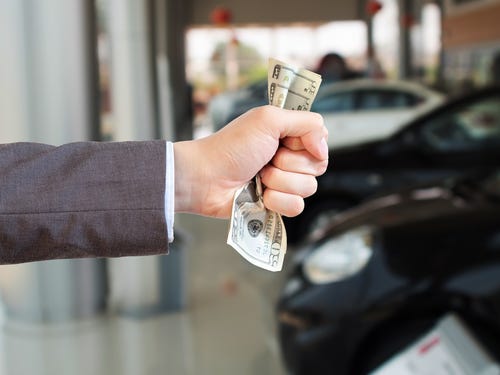What Is Title Pawning?
Have you ever found yourself in urgent need of cash and considered using your car as collateral? Title pawning offers a quick financial solution by allowing you to borrow money against your vehicle’s title. While it might seem like an easy escape from financial strain, this method carries its own risks and rewards. Curious about how it works and whether it’s the right choice for you? In this guide, we will see the intriguing dynamics of title pawning, where your car could be your ticket to immediate cash—or a costly gamble.

What Is Title Pawning?
Title pawning, also known as a title loan, is a type of secured loan where borrowers use their vehicle title as collateral. This means that the borrower temporarily hands over the legal ownership of their vehicle, usually a car, to the lender until the loan is repaid in full. Here’s how it generally works:
How Title Pawning Works?

-
Loan Application: The borrower approaches a title pawn lender and presents their vehicle along with its clear title—that is, a title without any liens against it.
-
Vehicle Assessment: The lender assesses the vehicle’s value, typically offering a loan amount that is a fraction of the vehicle’s appraised worth. This can range from 25% to 50% of the car’s value.
-
Agreement and Terms: If the borrower agrees to the proposed loan amount and terms, they must sign a loan agreement. This agreement details the loan amount, interest rate, repayment schedule, fees, and the consequences of non-payment.
-
Handing Over the Title: Upon agreement, the borrower hands over the vehicle’s title to the lender, who places a lien on it. However, the borrower retains physical possession of the vehicle and can use it as normal.
-
Loan Repayment: Title loans typically have a short term, often 30 days, although this can vary. They also carry high interest rates, making them more costly than many other forms of credit.
-
Repossession Risk: If the borrower fails to repay the loan on time, the lender has the right to repossess the vehicle. Once repossessed, the lender can sell the vehicle to recover the outstanding debt.
Advantages and Disadvantages of Title Pawning
Title pawning, while offering immediate cash relief, comes with its own set of significant advantages and disadvantages. Here’s an analysis to help understand both sides of this financial option:

Pros of Title Pawning
-
Quick Access to Cash: Title loans provide fast liquidity, often on the same day. This is particularly beneficial for individuals needing urgent funds for emergencies like medical bills or sudden large expenses.
-
No Credit Check: Since the loan is secured against the vehicle, lenders typically do not require a credit check. This makes title loans accessible to those with poor credit scores or limited credit history.
-
Keep Using the Vehicle: Borrowers can continue to use their vehicle while the loan is active. This is crucial for individuals who rely on their car for daily commuting or business operations.
-
Simple Process: The process of obtaining a title pawn is generally straightforward, involving minimal paperwork. This simplicity is appealing compared to the often complex and time-consuming procedures associated with other types of loans.
Cons of Title Pawning
-
High Interest Rates: Title pawns come with significantly high interest rates, often classified as short-term loans. These rates can quickly accumulate, making it difficult for borrowers to repay the loan without financial strain.
-
Short Repayment Terms: The repayment terms for title loans are typically very short, usually around 30 days. This can create a cycle of debt if the borrower is unable to repay the loan in time and opts to roll over the loan, incurring additional fees and interest.
-
Risk of Repossession: If a borrower fails to repay the loan, the lender has the right to repossess the vehicle. Losing a vehicle can be devastating, especially if it’s essential for the borrower’s employment or daily activities.
-
Additional Fees: Title pawns often come with various fees, including processing fees, document fees, late fees, loan origination fees, and lien fees. These can add up quickly, increasing the total cost of borrowing.
-
Debt Cycle: Due to high interest rates and short repayment terms, borrowers often find themselves in a cycle of debt. They may need to take additional loans to pay off the title pawn, further worsening their financial situation.
Frequently Asked Questions
What is a title pawn?
A title pawn, also known as a car title loan, is a type of loan where the borrower gives the lender the title to their vehicle as collateral in exchange for a loan. The borrower can still use their car, but the lender can repossess it if the loan is not paid back.
Can title pawns affect your credit score?
Generally, title pawns do not influence your credit score. Most title pawn lenders do not run a credit check during the application process. However, on-time payments won’t boost your credit since these lenders usually do not report them to credit bureaus.
What are the typical repayment terms for title pawns?
Title pawns are typically around $1000 and must be repaid within a timeframe of 15 to 30 days. Repayment is made either as a single payment, often after one month, or through an extended installment plan.
What are the main disadvantages of title pawns?
Title pawns are short-term loans requiring quick repayment, which can put financial pressure on the borrower. Failure to make payments can lead to late fees, causing the balance to rise exponentially. Ultimately, the lender can repossess your vehicle, causing further issues.
Does a title pawn affect my credit history?
In most cases, a title pawn does not impact your credit scores. Most providers of title pawn loans do not run a credit check during the application process. Such a check, known as a hard inquiry, usually reduces your credit score by a few points, but only temporarily.
What is a title loan?
A title loan is a loan where the borrower gives their vehicle’s title in exchange for a loan. Commonly known as a car title loan or pink slip loan, this allows the borrower to continue using the car, while the lender holds the title as collateral if the borrower defaults.

Hi! I’m Larry Gibbs, studying mechanical engineering with a focus on cars. I really love Ferraris and write blog posts about the latest car stuff. When not studying or blogging, I’m usually on a road trip exploring new places. I also enjoy playing football and watching movies. Life’s an adventure, and I’m all about enjoying the ride!






